Last Updated on August 28, 2021
Years ago, Life Alert popularized the concept of medical alert monitoring services to the general public with their “I’ve fallen and I can’t get up!®” advertising. Besides Life Alert, there are numerous companies that provide medical alert products and services in the US. In this post, we will list various top Life Alert alternatives for you or your parents to compare and look into.
In-Home Medical Alert Systems With Monitoring
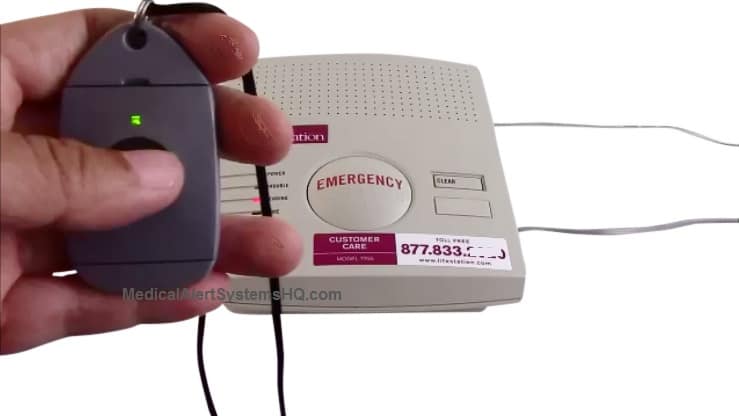
Standard in-home medical alert systems do what Life Alert’s standard in-home system does. They come with a base console unit and panic button that is usually worn around the neck. When an emergency happens, the user will press their panic button for help. This sends a call to a monitoring center through the base console unit. A representative will answer the call and speak with the elderly user to offer assistance.
Standard console units will connect through a home phone line like a traditional landline, and most VoIP or Cable phone lines. Newer cellular console units are also widely available. Those come with their own cellular network connection so users do not need to have their own phone line.
The main advantage of choosing these alternative companies compared to Life Alert is that they do not require multi-year contracts to get started. Most will let you pay month-to-month and cancel at will. This translates into less hassle if things change and you need to cancel.
Most of these medical alert companies offer competitive prices starting at $29.95 a month and do not require a separate start-up fee. See our full Life Alert Cost Comparison article.
LifeStation
An example of a Life Alert alternative is LifeStation. LifeStation is a large and respected medical alert company with 40 years of industry experience. They operate their own US-based monitoring center that meets high industry standards. The company also offers a full range of products options, from standard in-home systems, to fall detection and GPS systems. To learn more, check out our in-depth LifeStation review and LifeStation vs. Life Alert Comparison review.
Medical Guardian
Another worthwhile company to consider is Medical Guardian. Medical Guardian is the leader amongst a newer generation of medical alert companies that is bringing to the market both standard medical alert systems and newer monitoring technologies to help seniors live independently in their own homes. To learn more, check out our Medical Guardian review.
For more medical alert companies to compare with, check out our Medical Alert Systems Reviews section and Comparison Chart.
Medical Alert Systems With Fall Detection
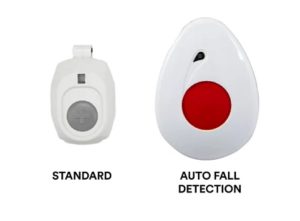
In-home medical alert systems work well for most customers, but some prefer the added protection of fall detection. Medical alert systems with fall detection are able to detect if the senior user has fallen and automatically place an alert call. In order to detect a fall, the system incorporates sensors into the necklace pendant.
This is especially helpful for seniors or other customers who are at higher risk of falling, fainting or experiencing sudden medical episodes that render them incapacitated. They may have difficulties or are completely unable to voluntarily press their panic button for help. Life Alert does not offer the fall detection, but fortunately there are other medical alert companies that do offer it.
If you can interested, check out LifeStation, Medical Guardian or Bay Alarm Medical for more information. These companies provide fall detection options with their various systems, including standard phone line, cellular “no phone line needed“, and selectively, their mobile medical alert systems.
Medical Alert Systems with GPS
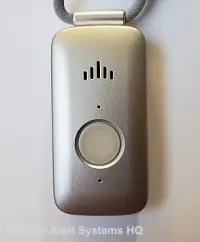
With the rise of GPS locations tracking technology, more and more seniors and their families have been looking into mobile medical alert systems that are not tethered to their homes. Life Alert offers its own version as well. These medical alert systems come with GPS trackers that will relay the unit’s location to the monitoring center. That provides an additional source of information to the monitoring center to ascertain where to deploy emergency help to (if it’s needed).
In comparison, in-home systems are registered to a stationary physical address. If alert calls come into a call center, the basic assumption is that the senior is at his or her home, and if need be, that is where help will be dispatched to. Some consumers deliberately shop for a medical alert system with long range, so that it works even when they are out and about. What they really need is a mobile medical alert system with GPS. There are no range restrictions – the system works wherever there is strong cellular network signals that it can connect to.
Mini Guardian GPS System
Medical alert systems with GPS typically come in the form of a small portable or wearable device. An example of a medical alert system with GPS is the Mini Guardian by Medical Guardian. This is a small water-resistant pendant that can be worn with a neck lanyard. It can be used both at home and out of the home.
Mini Guardian comes with its own speaker and microphone, so seniors and other customers can speak directly into it for help. The Mini pendant also offers fall detection as an add-on feature. To learn more, check out our Mini Guardian review.
Bay Alarm Medical GPS Mobile Alert System
Another option is the Bay Alarm Medical mobile medical alert with GPS. Like the Mini Guardian, it is a small pendant that comes with its own speaker and microphone. What distinguishes the Bay Alarm Medical GPS system for other systems is that it offers Caregiver Tracking. This is a password-secured online portal that will share the senior user’s GPS information with authorized caregivers and family members.
Elderly patients of dementia or Alzheimer’s disease are vulnerable to losing their direction and getting lost. Caregiver Tracking allows the elderly patient’s caregivers and family members to quickly locate them when the situation calls for it. To learn more, check out our Bay Alarm Medical GPS Mobile Alert System Review
For more choices, check out our Mobile Medical Alert Systems with GPS Reviews section.
Medical Alert Systems With No Monthly Fee
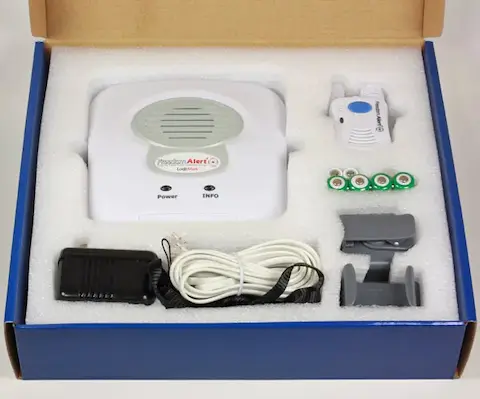
For seniors on a budget, medical alert systems with no monthly fees are viable alternatives to Life Alert or similar subscription-based systems. The main reason that it comes without a monthly fee is that there is no live monitoring access for users. Emergency calls are routed directly to the senior’s emergency contacts and/or 911.
Freedom Alert
As popular No Monthly Fee system is the Freedom Alert. It comes with a base console unit and a speakerphone pendant with a panic alert button. Similar to Life Alert, the user can press on their panic button if an emergency occurs. The system is designed to auto-dial up to 4 emergency contacts and then 911.
The manufacturer also produces another no monthly fee system called the Guardian Alert. The Guardian Alert calls only 911 and will not auto-dial emergency contacts.
The key advantage of no monthly fee systems like the Freedom Alert or Guardian Alert is that there are no continuing subscription fees. There is a one-time fee to purchase equipment. A main disadvantage of such systems is the lack of live support when an emergency actually happens. During emergency situations, a monitored solution ensures that a trained live person is always available to answer the phone and get the senior user help. To compare the pros and cons, check out this Monitored Vs Non-Monitored Medical Alert System Comparison.
Activity Monitoring and Tracking
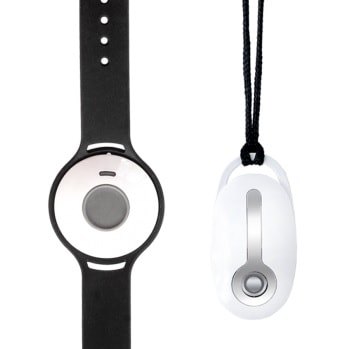
From time to time, readers inquire about medical alert systems that will monitor in the background for early warning signals of potential issues. Lifefone offers a basic Activity Assurance program that will check in with the senior system user on a daily basis. If mom is not well enough to answer the automated check-in, a monitoring representative will call her directly.
To recap, this post presented the main types of medical alert systems and various companies that are top Life Alert alternatives to consider in the market today. Take time to reflect through the needs of you or your parents, and browse through the links to reviews of the products that are the best fit.
- Bay Alarm Medical In-Home Cellular Response Speed 46% Faster in 2023 - July 5, 2023
- Medical Alert Systems For Landlines - November 20, 2022
- The Truth About Long-Range Medical Alert Systems - May 1, 2022
In a hurry? Leave us your email, we’ll follow-up with the best tips.

